FT Health: Lessons from the pandemic
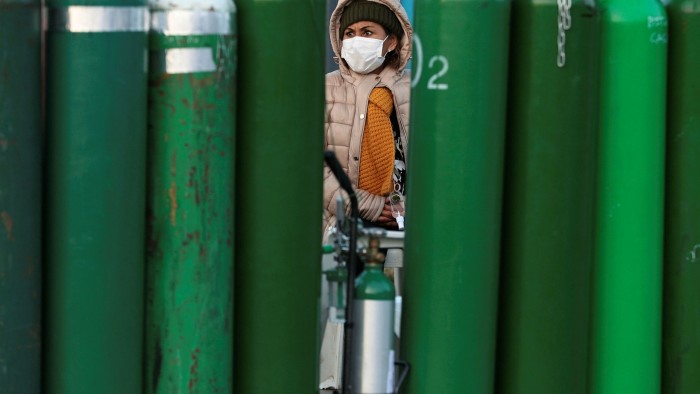
Roula Khalaf, Editor of the FT, selects her favourite stories in this weekly newsletter.
This is the final edition of the latest series of FT Health, our guide to the big issues at the intersection of global health and finance. Until our return, keep up with all our health journalism at www.ft.com and via Twitter @fthealth.
Coronavirus is far from over, but as policymakers and experts begin to assess the response to the crisis, they would do well to regard the lessons from past disease outbreaks.
Conclusions from a commission into the lethal spread of Sars from China into Hong Kong and Canada 15 years ago still ring true: policymakers should recognise that infectious diseases remain a threat; ensure close communication and collaboration; invest more in public health and integrate it with healthcare; and ensure cross-border solidarity and support.
But while Hong Kong and its Asian neighbours heeded many of the findings and were left better prepared, nations further from the epicentre like the UK — home to two of three doctors who wrote the evaluation — reacted less well to Covid-19 and have suffered more over the past year. As Dr Sian Griffiths, one of the authors, told the FT this week: “What made the difference was when health intersected with economies.” In other words, such problems are taken seriously only when they carry a financial cost — in this case the effect of closed borders on trade, travel and tourism.
Considerable progress has since been made around the globe in sharing information, conducting clinical trials and rapidly publishing results, as well as in the application of genomics and the development of innovative vaccines.
Yet much still needs to be done, not least in tackling “vaccine nationalism”, as illustrated by the recent tensions between the EU and AstraZeneca, and the very low levels of support for Covax, the WHO scheme to provide vaccines to low-income countries. As the FT argues, far more global co-operation is needed in everyone’s interests.
Furthermore, while much hope and attention are being placed on newer technologies to help tackle Covid-19, it should not distract from underlying investments in health systems. That has been highlighted by the chronic gap in access to oxygen to treat hospitalised patients, as we report below. Better funding and support for public health and treatment will help not only tackle coronavirus but prepare for future pandemics — from infectious and non-communicable diseases alike.
Covid catch-up
Last Saturday (January 30) marked the first anniversary of the WHO declaring the coronavirus outbreak a “public health emergency of international concern”. Total global cases last week passed the 100m mark while deaths are well beyond 2m with the daily average now more than double the figure of 6,800 from the spring peak. For the US, with close to 100,000 deaths, January was the deadliest month of the pandemic so far. Optimism over the introduction of vaccines is being tempered by the emergence of variants everywhere from the UK to Brazil. The investigation of the disease’s origin is now fully under way. (FT graphic, Washington Post, AP)
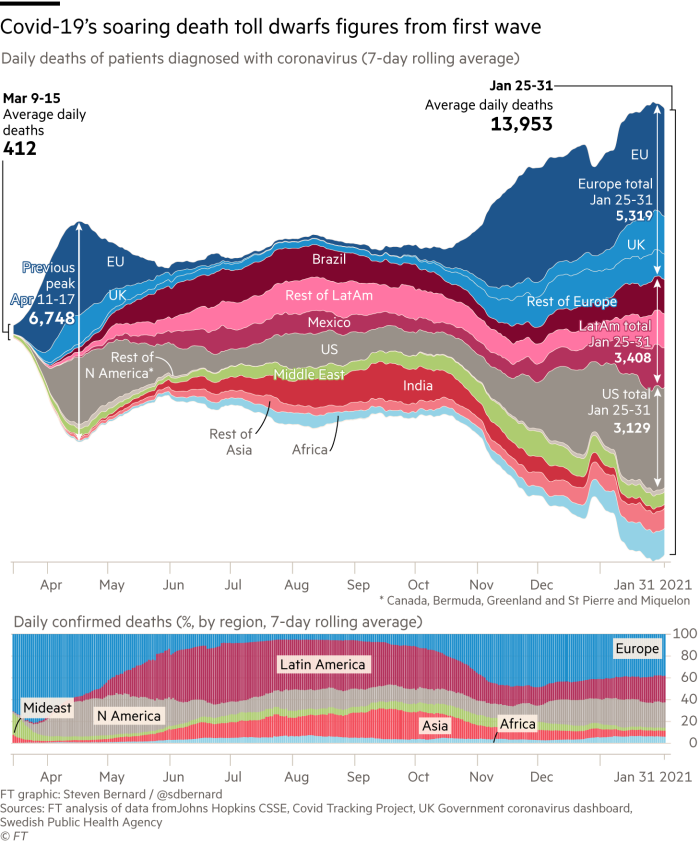
Key links
FT coronavirus tracker
WHO coronavirus dashboard
News round-up
Vaccinations under way . . . Programmes in advanced economies such as the UK and US are progressing well, although the EU has encountered supply problems. Countries such as India and China are starting to inoculate their own populations while making an international push to sell their vaccines. African countries are looking to Russia — whose Sputnik jab was shown this week to be 91.6 per cent effective — as well as China, to supplement vaccines from Covax, which on Wednesday published new forecasts for the availability of the Oxford/AstraZeneca and BioNTech jabs. Fears persist that vulnerable groups such as refugees and migrants remain at the bottom of the list. Follow progress of vaccinations around the world with the FT vaccine tracker. (FT, Devex)
. . . as Big Pharma adapts Although drugmakers are devoting huge resources to producing vaccines, it is still a feat of “complex choreography” to get shots into arms. Here’s a look at how they are speeding up development times to address new variants and here’s a graphical explainer on how the UK supply chain works. Latest developments include GSK and CureVac teaming up to work on jabs for new variants and indications that the Oxford/AstraZeneca vaccine not only reduces transmission but is also 76% effective for up to 12 weeks, bolstering the UK’s decision to delay second doses to inoculate more people.
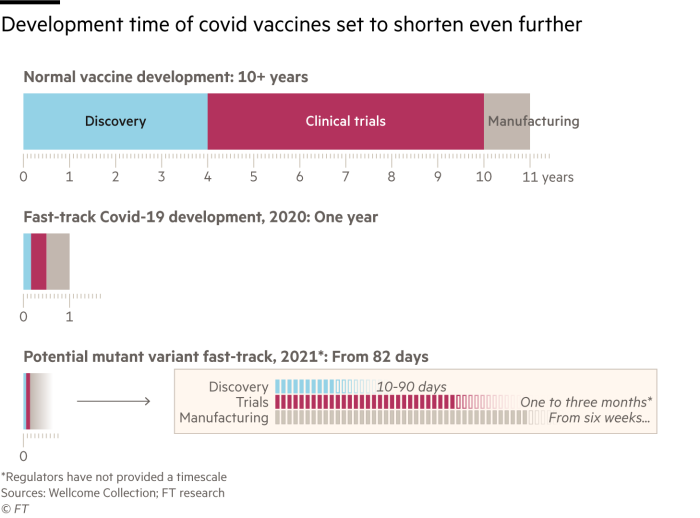
Struggling for air The jump in intensive-care patients because of the pandemic has led to serious shortages of medical oxygen in poorer countries. The Covid-19 Oxygen Needs Tracker suggests that middle and lower-income nations need more than 10.2m cubic metres a day — up from 8.5m in November. The World Bank, which has been criticised along with other donors for a fragmented and weak response to the pandemic, says few countries have formally requested support for oxygen and it is trying to co-ordinate more funding. (FT)
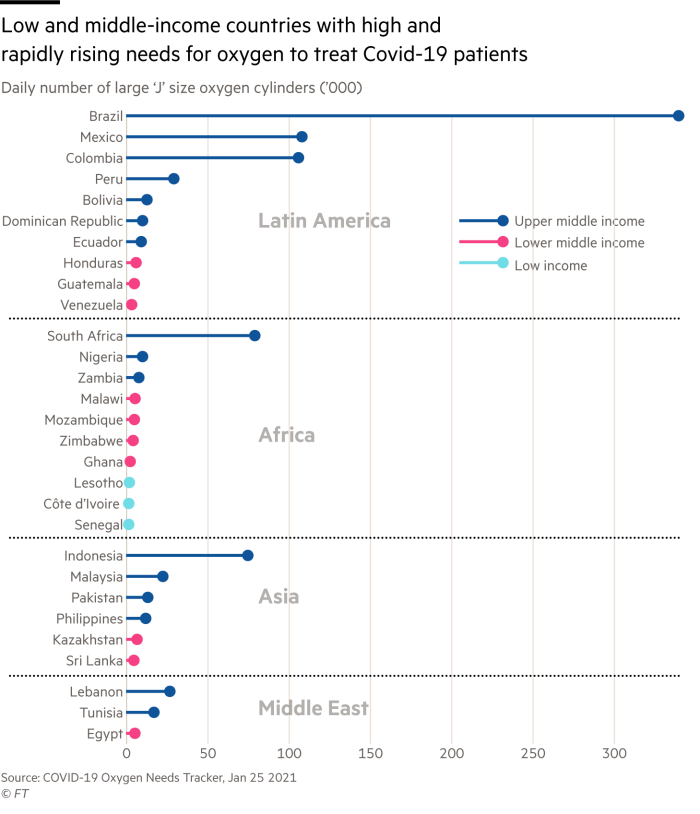
Access to medicine The new edition of the Access to Medicine index, which tracks how pharma companies are improving the availability of drugs in poorer countries for 82 diseases, sees GSK retain its top slot, followed by Novartis, Johnson & Johson, Pfizer and Sanofi. Companies are measured by governance of access, research & development, and product delivery. Other findings include how the focus on Covid-19 has left gaps in R&D for other infectious diseases. A separate report compares companies’ contributions to global health during the pandemic on criteria such as enforcement of patent rights, fair pricing and technology transfer. (Access to Medicine Foundation, News Medical, Pharmaceutical Accountability Foundation)
Assessing health data The Score report is the first global analysis of the state of national health information systems and aims to highlight critical data gaps — such as a lack of standardised recording of causes of death — for planning and monitoring purposes. (WHO)
Ten-year targets for NTDs The WHO used World NTD Day to publish 2030 goals to tackle neglected tropical diseases — such as dengue, leprosy and snakebite — that threaten more than 1.7bn people living in the world’s poorest communities. Key points include reducing by 90 per cent the number of people needing treatment; eliminating at least one NTD in at least 100 countries; eradicating dracunculiasis and yaws; reducing by 75 per cent the disability-adjusted life years (DALYs) related to NTDs. (World NTD Day, WHO)
Public-private co-operation A new report highlights the role of product development partnerships, the non-profit public-private projects fighting global health threats such as drug-resistant TB and malaria. (Keeping the Promise)
Combating cancer The number of people diagnosed with cancer is estimated to have hit 19.3m in 2020, with deaths increasing to 10m. The pandemic has disrupted diagnosis and treatment: the WHO said this week that 50 per cent of governments have had “cancer services partially or completely disrupted”. Here’s a list of special broadcasts for World Cancer Day tomorrow (February 4). (IARC, UN News, PM, World Cancer Day)
Fighting Ebola A new vaccine stockpile for Ebola — a disease which kills about half those it infects — is being set up by WHO, Unicef and other international organisations. The stockpile, stored in Switzerland, follows others created for yellow fever, meningitis, and cholera. (Cidrap)
African traditional medicine Efforts by the WHO and the Africa Centres for Disease Control to test the efficacy of traditional medicine — relied on by more than 80 per cent of Africans — have failed to bear fruit, with none of the proposed remedies yet to go beyond phase II clinical trials. (Devex)
Digital health The Lancet/FT Commission exploring how digital developments can benefit the health of the world’s poorest people, continues with a look at the experience of UK-based caBabylon in Rwanda. Read the rest of the FT report: The Future of AI and Digital Healthcare.
Covid and mental health More evidence is emerging of the effect of the pandemic on mental health. A European study highlights the impact on young people and those with a history of mental illness. Another shows the number of people seeking help in the UK fell markedly during the first lockdown, despite evidence of increased problems, raising fears of an unmet need leading to serious difficulties. Detailed studies are also beginning to emerge on the impact of working from home. (Lancet Regional Health, Lancet Public Health, Institute of Employment Studies)
Family planningThe use of modern contraception has hit new records in low-income countries, especially in Africa. It has prevented more than 121m unintended pregnancies, 21m unsafe abortions, and 125,000 maternal deaths in the last year alone, according to FP2020, a global initiative hosted by the UN Foundation. Progress has however taken a hit from Covid-19. Funding from donor governments for family planning held steady in 2019 at $1.5bn. The US is the largest bilateral donor, providing $592.5m or 39% of total funding in 2019, according to the Kaiser Family Foundation. (FP 2020, Guardian, Kaiser)
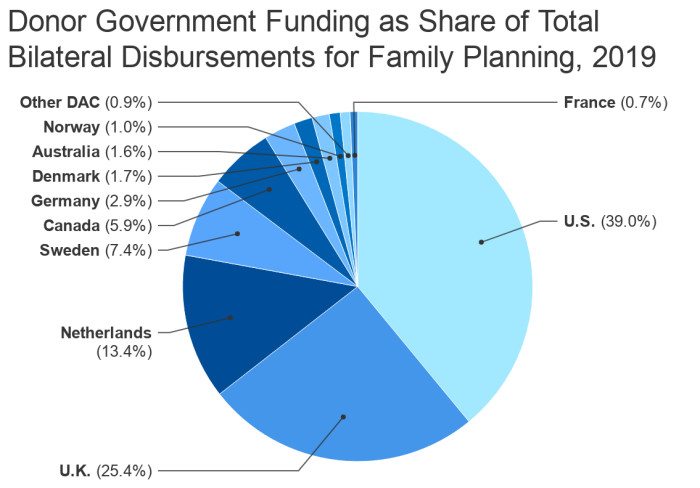
Best from the journals
Vaccination benefits The largest study to date of the effects of vaccination in low- and middle-income countries estimates that 69m deaths from 10 major diseases will have been prevented between 2000 and 2030. Without it, child deaths would be 45 per cent higher. Here’s an overview of 50 years of vaccine development. (The Lancet, NEJM)
Twitter as public health tool An analysis of Twitter posts on “pneumonia” in several countries just ahead of the formal announcement of Covid-19 outbreaks in those areas suggests social media could be an effective tool for monitoring the spread of diseases. (Scientific Reports).
Burden of blindness A new report highlights the global prevalence of causes of blindness and vision impairment. Cataracts for example are responsible for the blindness of 15m adults over-50. Other typical sources for vision problems include undercorrected refractive error, glaucoma, age-related macular degeneration, and diabetic retinopathy. (The Lancet Global Health)
Smoke signals Despite an overall reduction in cigarette use over the last 20 years, a large global study shows many countries are failing to make headway in reducing smoking among adolescents amid a rise in non-cigarette tobacco products. (Lancet Child & Adolescent Health).
Global health research? Despite recent improvements, studies on low-income countries are still far less prevalent than those concerning their richer counterparts and authors are far less likely to come from those poorer countries. (BMJ Global Health)
Medicine and the holocaust A new commission will examine the role of medicine in the Nazi era and its ethical implications for today. (The Lancet)
Pick of the pods
Vaccines in Africa A member of the Nigerian Covid-19 task force explains the impact of the pandemic in his country and difficulties in securing vaccine supplies. (UN Global Dispatches, 22m)
Fauci on Covid-19 NEJM editors discuss testing, therapeutics, and vaccines with top US infectious disease expert Anthony Fauci. (NEJM, 43m)
Spanish lessons Journalist Nick Cohen speaks to Laura Spinney, author of Pale Rider: The Spanish Flu Of 1918 about the lessons to be had from the greatest public health disaster in history. (The Bunker, 23m)
Anti-vaxxers A discussion of why some people are susceptible to the lure of anti-vaccine theories, the role of social media companies in countering fake news and anti-vaxxers’ links with the far-right. (Politics on the Couch, 50m)
Biden’s health agenda Discussion of the new US president’s health policies and the chances of domestic reforms while enjoying only the barest majority in the Senate. (Kaiser What the Health, 35m)
The month ahead
Feb 4 World Cancer Day
Feb 4 Time to Talk Day (UK) — encouraging discussion of mental health
Feb 6 UN Day of Zero Tolerance to Female Genital Mutilation
Feb 8 WHO Non-communicable Diseases Progress Monitor (here is 2020)
Feb 11 First anniversary of WHO naming novel coronavirus disease Covid-19
Mar 11 World Kidney Day
Mar 11 First anniversary of Covid-19 declared a pandemic
Mar 24 World Tuberculosis Day
End notes
Previous issue Priorities for 2021
Contact Email us via health@ft.com, like us on Facebook and follow us on Twitter @fthealth.
More FT resources Free FT.com access for all NHS staff has been extended to March 31: Register here. You can find all FT in-depth health reports at FT Health Centre.
Coronavirus Business Update Sign up here for our newsletter chronicling the epidemic’s impact on markets, global business, workplaces and our daily lives. The FT is offering a free 30-day trial to this email, which includes access to FT.com.
Final thought
We couldn’t end without a big thank you to all our readers, especially for your feedback on our health journalism, whether by email, commenting beneath articles or on Twitter via @fthealth. We appreciate your input.
Comments